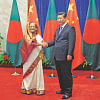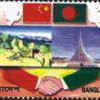Under cricket's shadow

Bangladesh holds the ignominious title of being the world's most populous nation not to win any Olympics medal ever. Our performance in the Commonwealth Games is also no less than shabby. The country has participated in the quadrennial sporting extravaganza eight times and has so far won only six medals. At the Asian Games, where Bangladesh has been participating since 1978, the country has won only one gold medal, that too in cricket, which has remained our lone face saver. Other sports seem to be deprived of the expectation and enthusiasm that cricket generates, and there are reasons behind it too.
Bangladesh's performance in athletics and such individual sports has witnessed a sharp decline. Boxer Mosharraf Hossain made history in the Asian Games in Seoul when he clinched the men's light heavyweight bronze medal in 1986. None of our boxers have won any medal in the Asian or Commonwealth Games since then. To make matters even more grievous, save for golfer Siddiqur Rahman, all our participations in the Olympics have been wildcard entries. The only event where we can compete with some ease is the South Asian (SA) Games. That, too, is getting difficult for us. In the SA Games held in India this year, 409 participants of Bangladesh won only four gold medals. Kabbadi, our national sport, is a case in point. In the 2016 SA Games, our men's team had won bronze, Pakistan won the silver and India the gold.
Our ever deteriorating performance in the international meets is not shocking. In fact, it is a natural by-product of the neglect and indifference that has reigned supreme in the sector for a long time. Save for Asif Hossain Khan, the first Bangladeshi shooter to strike gold at the Commonwealth Games, and cricketers like Shakib Al Hassan and Mushfiqur Rahman, our only government-run sports institute in Savar has not yet produced any internationally renowned athletes since its establishment in 1986. This is sad, given that the institute admits students in different areas of sports such as athletics, basketball, cricket, football, gymnastics, hockey, swimming, shooting and tennis.
In our media, sport is almost made to be confined to cricket only. Football and hockey, which have earned the country glory in the early eighties, have become a part of our forlorn past. Cricket's success has overshadowed the progress of all other sports. Who would, after all, want to be a second-rate shooter, when cricket, a short route to fame and glory, remains at hand?
Bangladesh badly needs to create a sporting infrastructure that will reflect its growing economic power. Sadly, that has not happened in the last 26 years since the restoration of democracy. On the contrary, we have witnessed the advent of a get-rich-quick lifestyle that has given birth to consumerist behaviour in our youth. Not only that, playgrounds that used to exist in different cities have been allowed to be encroached upon; their absence deprive children of any proper sporting facilities. A majority of the children who grow up in the cities do not have any government-run facility at hand to learn swimming, let alone compete in track and field and other sporting events.
As a quick remedial measure, athletics and other sports should be encouraged from an early age. This can begin from the primary level. The authorities concerned can divide the country into small zones and the schools will be allotted coaches accordingly who, for their turn, will visit the respective institutions on certain days of the week. In this way, it will be possible for our youngsters to hone in their talents. Also, our sport organisers will be able to discover future Usain Bolts at an early age.
We must not forget that to build a sporting culture, we need to have well-trained coaches with the insight and the expertise that will help young talents grow. To do that, we need to have training institutes for coaches in each divisional headquarters. Along with it, there ought to be government funded programmes to make sure the coaches get the opportunity to further their studies abroad.
One of the reasons youngsters shy away from sport is because it does not earn money. A nationwide biannual sporting meet can be organised which will be participated by the corporate houses and government-run organisations. It will encourage the big businesses to welcome more athletes and sportpersons under its fold. On the other hand, for the youngsters, it will be a motivating force in pursuing sport as a career.
Sport is the biggest deterrent against all forms of social malice. It is no less than surprising that our shaky existence in international sport is directly proportional to the social chaos that we witness in the country. A society with such a huge youth bulge runs the risk of getting derailed if it does not channel the youthful energy into something positive such as sports. Cricket alone is not capable of doing that.
The writer is author, editor and journalist. He is Literary Editor of The Daily Star and Head of Daily Star Books.

 For all latest news, follow The Daily Star's Google News channel.
For all latest news, follow The Daily Star's Google News channel. 






Comments